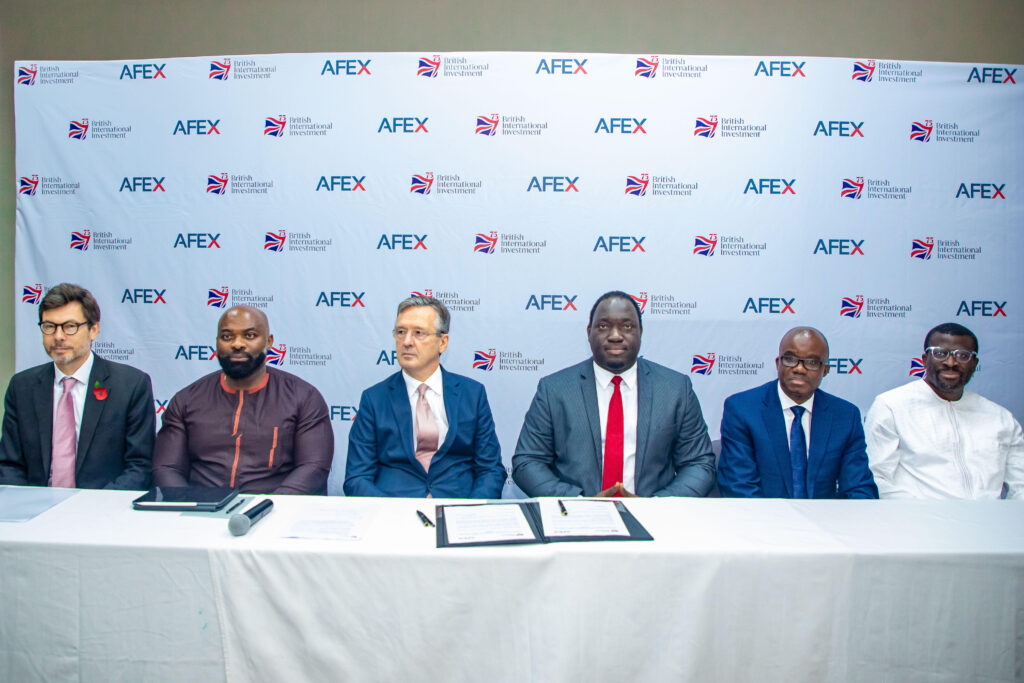In a significant move to combat food insecurity in Africa, AFEX, a leading agricultural commodities exchange company has announced the successful acquisition of a $26.5 million investment commitment UK’s Development Finance Institution (DFI) and Impact Investor, British International Investment, BII.
The investment will support AFEX which currently operates over 200 warehouses in Nigeria, Kenya, and Uganda and serves over 450,000 farmers structural improvements in Africa’s agricultural industry, which will significantly benefit smallholder farmers and lead to improvements in food security.
The signing of BII and AFEX’s new partnership was attended by British Deputy High Commissioner in Lagos Jonny Baxter, BII Chief Executive Officer Nick O’Donohoe, and AFEX Group CEO Ayodeji Balogun.
According to the document BII’s investment will be used to build 20 modern warehouses in strategic locations in Nigeria, Kenya, and Uganda.
Its capital will also scale warehouse technology and next-generation software that captures post-harvest pricing. Smart storage solutions have the potential to preserve the lifespan of harvested crops, thus increasing the volume of food available.
The additional warehouses will provide 230,000 MT of storage capacity, enabling up to 200,000 more farmers to access low-cost storage and maximize sales from crop harvests, potentially helping increase farmer incomes by more than 200 percent.
Supporting smallholder farmers to achieve a fair wage is vital to ensure they remain in operation, producing more and higher quality crops for local consumption.
Agriculture in Nigeria, Kenya, and Uganda accounts for a quarter of GDP and employs 70 percent of their populations – 80 percent of whom are smallholder and subsistence farmers.
Currently, farmers face a difficult financial outlook due to macroeconomic uncertainty, limited market access, and poor reliability of sales from crop harvests. Yields have fallen, and farmers’ incomes are increasingly affected by price hikes of agricultural inputs and extreme weather events.
BII’s capital will also be used to develop a soybean processing plant in Ibadan, the third-largest city by population in Nigeria, and a drying facility in Uganda.
The construction of the storage facilities and soy processing facilities will generate over 700 temporary jobs and more than 80 permanent roles.
Commenting on the transaction, BII Chief Executive Officer, Nick O’Donohoe said, “The World Bank estimates that Africa’s food import bill has reached $30 billion in recent decades. This is why we need to back technology-driven companies like AFEX because they help reduce that import cost by supporting smallholder farmers to increase local food production, while also boosting their incomes.”
Speaking about the raise, AFEX Group CEO, Ayodeji Balogun said, the investment from British International Investment is a landmark moment in our mission to revolutionize agriculture and elevate food security across Africa.
“By directing fresh capital towards the development of technologically advanced warehouses and critical facilities, we are significantly enhancing market access and income potential for smallholder farmers.
“In alignment with UN SDGs, our mission is to enable Africa to feed itself efficiently and sustainably. Today’s investment doesn’t just propel AFEX’s growth, it forges a more secure and prosperous future for an entire continent,” he said.

British Deputy High Commissioner in Lagos, Jonny Baxter in his remark said that he is proud of British International Investment’s support which according to him will enhance agricultural productivity and bolster food security in Nigeria.
“The agricultural sector stands as a vital pillar to Nigeria’s economy, playing a significant role in job creation and investment potential.
“The UK provided early-stage funding to AFEX, and I am delighted to see the company grow with such success. We look forward to continuing to support Nigeria’s agriculture sector and the opportunities this provides for its economic growth,” he said.
This investment will contribute to the United Nations’ sustainable development goals of Zero Hunger (SDG2), Decent Work and Economic Growth (SDG8), and Responsible Consumption and Production (SDG12).
By Dare Akogun





